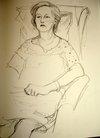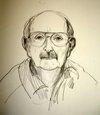The past few weeks have been full of excitement for Serotonin, a neurotransmitter that modulates mood and behavior. "Today" host Matt Lauer sat down with the molecule, and talked about his recent work, as well as Tom Cruise's comments.Matt Lauer: Anything at all interesting happening in your life these days?
Serotonin: Matt, I was on Capitol Hill last week, testifying about Prozac and suicide. And I'm helping NIMH with a novel antidepressant that will only make people feel good when they do good...when they, you know, do good things for others. We think it's the next big thing.
Lauer: Did you see the Cruise interview?
Serotonin: I did, Matt. We watched it at APA headquarters. I can tell you, the mood was grim.
Lauer: How did they react?
Serotonin: Matt, Psychiatry has always had enemies. But Cruise's outfit is unique. They have religious zeal, and they have resources. And they use them. A forceful, determined man like Cruise, with his mind made up...well, you probably felt it yourself.
Lauer: Like a steamroller.
Serotonin: An influential steamroller...at least, potentially so.
Lauer: What do you make of his arguments?
Serotonin: It's not hard to argue against psychiatry, but his particular arguments showed some pretty significant distortions...
Lauer: Give us an example.
Serotonin: Well, he said, "There's no such thing as a chemical imbalance." Matt, I'm a brain chemical myself. I can answer this.
Lauer: Please!
Serotonin: When psychiatrists talk about "chemical imbalances in the brain," they're talking about a theory. They're referring to our best guess about how drugs like Prozac work. The way they think about it is, first, there's a set of serious symptoms, that we call depression. There are drugs that reliably improve these symptoms, to a greater extent than placebos, in controlled studies.
Lauer: Sometimes, not much more than placebo, right?
Serotonin: Right. But, nonetheless. The drug improves the symptoms, and shortens the time to recovery. Then we look at this drug in the lab and ask, how does it work? What does this drug do? In the lab, the drug affects the activity of brain chemicals...including, yours truly.
Lauer: You see this in the lab.
Serotonin: Right. So, how do you explain all this? There's a theory: in depression, the brain chemicals are not balanced, and these drugs help to restore the balance. So in a way, there's a grain of truth to what he's saying: no one has ever shown definitely, "here is exactly what a 'normal' balance really is, and here is the precise 'chemical imbalance' that causes depression."
We're still working on it.But is psychiatry a sham, because we don't have all this worked out yet? Depression can be life-threatening, and we have meds that help most people. Do we not use these meds, because we can't define the chemical balance? What is the wise use of these meds? That's the real question.
Lauer: Can you measure my chemical balance with a blood test?
Serotonin: There's no blood test. To diagnose depression today, you need history, you look for signs and symptoms...I don't know if we'll ever have a blood test. Really, Matt, there are so many things to measure...it's so complicated. There are hormones, there are genetic factors...
Lauer: Right. We've invited DNA to speak here tomorrow on the Today Show, and we'll ask him some more about that. But tell me, what about psychological factors and depression?
Serotonin: Ah! This is a favorite subject of mine. Which patients get the most improvement in their depression? The ones who get both psychotherapy and meds. They do better than those who get meds alone. Now, why is that?
Lauer: Why is that?
Serotonin: We don't know why, but it's true.
We think depression has biological, psychological, and social roots. The best treatments address all those factors. Are we discovering that an idea can change emotions, and change behavior? That something that occurs during psychotherapy can change the so-called "chemical balance in the brain?" Again, it's a theory. Many scientists are hot on the trail of this one.
Lauer: It's an exciting time. Thank you, Serotonin, and best of luck on your projects!
Serotonin: Thanks, Matt.












